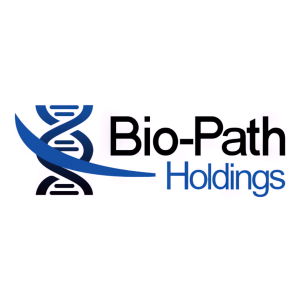Bio-Path Holdings Provides 2024 Clinical and Operational Update
Clinical Advances Across Multiple Programs with Several Milestones
HOUSTON, April 02, 2024 (GLOBE NEWSWIRE) -- Bio-Path Holdings, Inc., (NASDAQ:BPTH), a biotechnology company leveraging its proprietary DNAbilize® liposomal delivery and antisense technology to develop a portfolio of targeted nucleic acid cancer drugs, today provides a clinical development and operational update for 2024.
“The new year is off to a strong start as we build off positive data generated in 2023 that compel us to advance these studies as quickly as possible and to file for regulatory designations that could accelerate our path to approval,” said Peter H. Nielsen, President and Chief Executive Officer of Bio-Path. “There is no greater challenge than the battle against cancer, and developing effective new medicines for patients suffering with few treatment options is what drives us every day. The substantial progress we have made gives us further confidence that our DNAbilize® platform is ushering in a new path of DNA-powered medicines that can make a difference in the lives of these patients.”
Clinical Program Overview
Bio-Path’s clinical development program consists of one Phase 2 clinical trial and three Phase 1 or 1/1b clinical trials. Bio-Path is developing a molecular biomarker package to accompany prexigebersen treatment and expects to evaluate prexigebersen for the treatment of obesity. In addition, one further drug candidate is in the final stages of preclinical development, which may be submitted to the U.S. Food and Drug Administration (FDA) later in the year in an Investigational New Drug (IND) application.
Development of Molecular Biomarkers – Bio-Path is developing a molecular biomarker package to accompany prexigebersen treatment, the goal of which is to identify patients with a genetic profile more likely to respond to treatment thereby improving probability of success for this program. The emerging role of biomarkers has been enhancing cancer development over the past decade and has become a more common companion to many cancer development programs. Bio-Path expects to develop molecular biomarker packages to accompany its new programs.
Prexigebersen Phase 2 Clinical Trial – Bio-Path’s Phase 2 clinical trial is treating Acute Myeloid Leukemia (AML) patients. This trial is comprised of three separate cohorts of patients and treatments, each separately approvable by the FDA as a new drug indication. The first two cohorts are treating patients with the triple combination of prexigebersen, decitabine and venetoclax. The first cohort includes untreated AML patients, and the second cohort includes relapsed/refractory AML patients. Finally, the third cohort is treating relapsed/refractory AML patients, who are venetoclax-resistant or intolerant, with the two-drug combination of prexigebersen and decitabine. Based on positive interim data for safety and efficacy, the Company plans to pursue FDA Fast Track designation for the accelerated approval of prexigebersen for the treatment of fragile AML patients who are unable to tolerate intensive chemotherapy and thus experience very poor clinical outcomes. Outcomes for these older patients, who are unable to receive intensive chemotherapy due to the challenging side effect profile, remain suboptimal with a median survival of only 5 to 10 months.
Phase 1/1b Clinical Trial in BP1001-A in Advanced Solid Tumors – A Phase 1/1b clinical trial of BP1001-A in patients with advanced or recurrent solid tumors, including ovarian and uterine, pancreatic and breast cancer, is ongoing. BP1001-A is a modified product candidate that incorporates the same drug substance as prexigebersen but has a slightly modified formulation designed to enhance nanoparticle properties. The Phase 1 study has advanced to the second, higher dose level. The Phase 1b portion of the study is expected to commence after successful completion of the three BP1001-A monotherapy dose level cohorts and is intended to assess the safety and efficacy of BP1001-A in combination with paclitaxel in patients with recurrent ovarian or endometrial tumors. Phase 1b studies are also expected to be opened in combination with gemcitabine in Stage 4 pancreatic cancer and combination therapy in breast cancer.
Phase 1/1b Clinical Trial in BP1002 in Relapsed/Refractory AML – A Phase 1/1b clinical trial for BP1002 to treat relapsed/refractory AML patients, including venetoclax-resistant patients, is ongoing. BP1002 targets the protein Bcl-2, which is responsible for driving cell survival in up to
Phase 1 Clinical Trial in BP1002 in Refractory/Relapsed Lymphoma and Chronic Lymphocytic Leukemia (CLL) – A Phase 1 clinical trial to evaluate the ability of BP1002 to treat refractory/relapsed lymphoma and refractory/relapsed chronic lymphocytic leukemia (CLL) patients is currently ongoing. The Phase 1 clinical trial is being conducted at the Georgia Cancer Center while two additional clinical trial sites are currently being activated for inclusion in the study, The University of Texas Southwestern and New York Medical College. In January 2024, Bio-Path announced successful completion of the first dose cohort in the Phase 1 clinical trial. A total of six evaluable patients are scheduled to be treated over two dose levels with BP1002 monotherapy in a standard 3+3 design, unless there is a dose limiting toxicity which would require an additional three patients to be tested. There were no dose limiting toxicities in the first dose cohort (20 mg/m2). Enrollment is now open for patients for the second BP1002 dose cohort of 40 mg/m2.
Preclinical Work for BP1003 – The Company continues to advance its drug candidate, BP1003, for the treatment of advanced solid tumors, including pancreatic cancer. BP1003 is an antisense RNAi nanoparticle targeting the STAT3 protein. Plans are to conduct a Phase 1 study of BP1003 in patients with refractory, metastatic solid tumors (pancreatic, non-small cell lung cancer).
Prexigebersen as Potential Treatment for Obesity and Obesity-related Cancers – The RNAi target of prexigebersen is the Grb2 protein, which is involved in activating the RAS/ERK pathway for cell growth. By blocking the cell’s ability to produce Grb2, prexigebersen treatment may limit cell growth. In obesity, two such pathways are related to leptin and insulin. Activation of leptin or insulin receptors can stimulate the RAS/ERK pathway via Grb2i.
Bio-Path believes development of prexigebersen for the treatment for obesity and obesity-related cancers could be accelerated given the large amount of safety data from prexigebersen treatment of leukemia patients and the continued unmet medical need. The Company expects to evaluate prexigebersen for the treatment of obesity as soon as corporate resources are sufficient.
Intellectual Property Protection
Bio-Path’s composition of matter patents protect encroachment from third parties on its proprietary products. This technology is solely owned by Bio-Path. These composition patents allow the Company to apply its core technology to new protein targets and receive new 20-year patents. Bio-Path’s patent portfolio is as follows:
- Composition and methods of use patents issued cover DNAbilize technology, solely owned by Bio-Path.
- Five issued patents in the U.S. and 53 issued patents in foreign jurisdictions, providing protection in 21 countries.
About Bio-Path Holdings, Inc.
Bio-Path is a biotechnology company developing DNAbilize®, a novel technology that has yielded a pipeline of RNAi nanoparticle drugs that can be administered with a simple intravenous transfusion. Bio-Path’s lead product candidate, prexigebersen (BP1001, targeting the Grb2 protein), is in a Phase 2 study for blood cancers, and BP1001-A, a drug product modification of prexigebersen, is in a Phase 1/1b study for solid tumors. The Company’s second product, BP1002, which targets the Bcl-2 protein, is being evaluated for the treatment of blood cancers and solid tumors, including lymphoma and acute myeloid leukemia. In addition, an IND application is expected to be filed for BP1003, a novel liposome-incorporated STAT3 antisense oligodeoxynucleotide developed by Bio-Path as a specific inhibitor of STAT3.
For more information, please visit the Company's website at http://www.biopathholdings.com.
Forward-Looking Statements
This press release contains forward-looking statements that are made pursuant to the safe harbor provisions of the federal securities laws. These statements are based on management's current expectations and accordingly are subject to uncertainty and changes in circumstances. Any express or implied statements contained in this press release that are not statements of historical fact may be deemed to be forward-looking statements. Any statements that are not historical facts contained in this release are forward-looking statements that involve risks and uncertainties, including Bio-Path’s ability to raise needed additional capital on a timely basis in order for it to continue its operations, have success in the clinical development of its technologies, the timing of enrollment and release of data in such clinical studies, the accuracy of such data, limited patient populations of early stage clinical studies and the possibility that results from later stage clinical trials with much larger patient populations may not be consistent with earlier stage clinical trials, the maintenance of intellectual property rights, that patents relating to existing or future patent applications will be issued or that any issued patents will provide meaningful protection of our drug candidates, the impact, risks and uncertainties related to global pandemics, including the COVID-19 pandemic, and actions taken by governmental authorities or others in connection therewith, and such other risks which are identified in BioPath's most recent Annual Report on Form 10-K, in any subsequent quarterly reports on Form 10-Q and in other reports that Bio-Path files with the Securities and Exchange Commission from time to time. These documents are available on request from Bio-Path Holdings or at www.sec.gov. Bio-Path disclaims any intention or obligation to update or revise any forward-looking statements, whether as a result of new information, future events or otherwise.
Contact Information:
Investors
Will O’Connor
Stern Investor Relations, Inc.
212-362-1200
will@sternir.com
Doug Morris
Investor Relations
Bio-Path Holdings, Inc.
832-742-1369
i Casado ME et al. (2023) Recent Advances in the Knowledge of the Mechanisms of Leptin Physiology and Actions in Neurological and Metabolic Pathologies. Int J Mol Sci 24(2): 1422. Published online 2023 Jan 11. doi: 10.3390/ijms24021422)










